I often get the question:
How do you travel for so long between jobs?
When I begin to answer, I realize it’s not so cut and dried. There are at least 10 ideas that want to jump out of my mouth simultaneously. So I felt it would be easier to answer the question in an organized piece of content.
Many people have it etched in their minds that traveling the world has to cost a lot of money. While it can, it doesn’t have to.
You don’t have be financially rich to travel. Many travelers I meet aren’t wealthy per se. They adapt a mindset. If travel is enough of a priority, they create the monetary loopholes to make it happen.
Here are 10 easy travel hacks that’ll aid in conserving your valuable earth drifting dollars.
1. Use Accommodation Sites to Find Lodging But Don’t Always Book Ahead
Show up and see what the price is for a walk-in. From my experience, this usually, but not always, allows for a cheaper price. In addition, it gives you the opportunity to haggle the price down, especially if you’re ready to pay for multiple nights.
For example, the best deal I found online in Hanoi was the Hotel Hanoi for $19. But by showing up without a booking, I was told the walk-in rate was $17.
That’s only a $2 savings, but if you do that every day for a year, that’s $730. While $2 isn’t much, a year goes fast and $730 isn’t chump change. This holds even more true in countries where two dollars can go as far as six, or more of those efficient greenbacks.
$2 isn’t the savings limit by any means. At Chaisuk Bungalow in Aranyaprathet, Thailand, the cost listed on google maps was $4 more than the walk-in rate. I stayed 2 nights. That’s $8 I didn’t pay by showing up unbooked.
The online agent’s commission was eliminated. That’s typically a win-win for both the establishment and the traveler.
I don’t typically book online in advance unless I’m arriving in a big city at night. Even in these cases, I might just show up and hit the pavement on foot, looking for a better deal. Or I’ll check in for a night somewhere and keep my eyes open for an enhanced value. This is often best done by walking into places and asking.
Not booking ahead of time works better in low or shoulder season than in high season. And it depends on how touristy the city or area of a city is. If it’s extra-touristy there are probably many hotels in place, vying for your business.
If it’s high season, then you may want to book your first night. This is also true if you’re arriving in a big city after dark. This way, having booked for one night gives you peace of mind and safety on arrival.
You’ve probably done your research and know something about the place you’re flying into. For example, if you’re arriving in a city like Caracas, Bogotá, Lagos or Johannesburg, then have a hotel booked and go there from the airport. These are cities where you need to be mindful of street smarts.
It wouldn’t be wise to wander aimlessly with your luggage as you could be a target.

While La Candelaria in Bogotá is mostly fine, I’d go as far to estimate that it’s 99% safe. But if you set yourself up as a target, that 1% might inflate to 5 or 10%.
Have a place booked for your first night. If you’re sure your hotel won’t be full, then show up withouth a booking, like I did at the Hotel El Dorado.
Over 99% of people who live in Bogotá don’t want you to get mugged, robbed or maybe even killed. (Probably not the latter but you never know).
This vast majority of decent citizens will wholeheartedly agree that this is not a place to take your chances walzing merrily through the streets with a bag or two looking for a place to stay.
Research your destination.
On the other hand, cities in SE Asia tend to be safe, so wander to your heart’s content if you’re determined on getting an eminent value.
At the moment, I travel chronically so I feel I must find the best value available. I typically don’t sleep in shared hostel space. Having my own room and bathroom boasts a better value, especially in lower budget, tropical countries where an OK room can sometimes be had for as low as $10, especially outside major cities.
Costs vary considerably depending not only on where on earth you are.
The countryside is typically cheaper than big cities and capitals.
Northeastern Thailand tends to be more inexpensive than the rest of Thailand. Usually, the less touristy an area is, the more affordable it’s going to be.
Although I try to keep my drifting expenditures as low as possible, I’m not looking for the cheapest but the most favorable value. An ideal situation has a comfortable bed, a window for fresh air and the mitigation of claustrophobia, night-time quiet and darkness, a desk and good Wi-Fi access. Knock on wood.

One reason I like Khon Kaen, Thailand so much is the Ruen Rom Hotel where I get a rate of 360 Baht ($10.50) when paying cash for a few nights ahead of time. This is a 10% discount from the 400 Baht listed when you walk in.
This spacious room at the Ruen Rom Hotel must be one of the best values on the planet.
2. Keep an Eye Out For Off-the-Grid Accommodation
If you’re in a touristy area, there are usually many places vying for your business. And, depending on where you are, you may be able to find mom & pop guesthouses or homestays that don’t use online booking sites or do any advertising. There are owners who want to keep things simple with word-of-mouth and off-the-street customers.
Their costs tend to be cheaper thanks to eliminating the digital reservation giants.
At Inthasack Guesthouse in Luang Prabang, a local mom & pop facility, I paid $8 per night. They don’t use booking sites. I found it by walking in. I loved the local neighorhood, which is 2 km from the historic center.
There’s an excellent, traditional Lao sauna facility a five-minute walk away. Like the above establishment in Khon Kaen, Inthasack is one of the best value accommodations on earth.
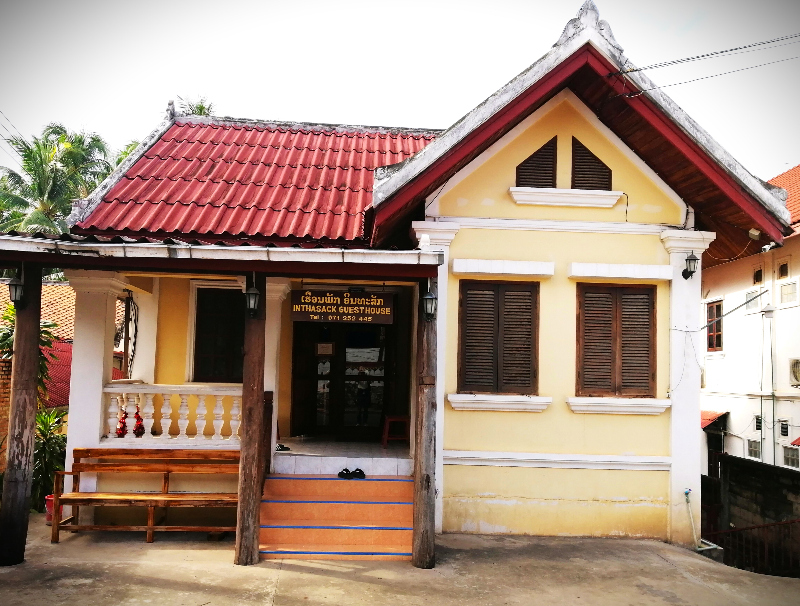
This is the best value I found in Luang Prabang, a UNESCO city, where the local owner who lives there prefers only walk-ins and word of mouth.
3. Monthly Rentals as Opposed to Nightly Rates
Monthly rentals can save a bundle. I recently rented a room in Da Nang for two months. I had to pay a one month security which I got back when I checked out. Including electricity and water, drinking water, and good Wi-Fi, the cost was $155 per month.
While living in a hotel room isn’t ideal, it was in good shape and the cost was low.

If you’re in the position to do it, renting by the month can obviously save a ton.
4. Don’t Visit Places That Have Been Victimized or Blessed by Hyper Tourism
Halong Bay is very close to Hanoi. From the pictures it looks like one of earth’s greatest geographical wonders. Did I want to go? Yes!
Did I want to be a tourist looking at the same surreal nature as 1,000 other tourists simultaneously? No!
Would I visit Venice or Barcelona in the summer? I’d need a good reason because from what I gather, these cities experience hyper tourism. Not to mention, western Europe isn’t a budget destination unless you’re sleeping in shared rooms, eating mostly out of grocery stores and utilizing free parks and good public transportation services.
At the time of writing, it’s high season in South East Asia. I recently entered into my previously beloved Laos, only to find that everything was pricier, noisier and fuller because it’s high season.
For example, bullet train seats were filled up for days in advance and I couldn’t get my excellent deal at the In Touch Guesthouse in downtown Vientiane.
So after a few nights, I spontaneously crossed back into Thailand and down to Khon Kaen as it’s a proper Thai city with many amenities and few tourists.
Things seem normal. No one’s trying to sell you anything. People appear kinder, and more genuine since most foreign revelers don’t stop there. In that sense, it’s the complete opposite of the great Thai tourist centers of Chiang Mai, Pattya, Phuket and Bangkok.
Eeating, sleeping and traveling can be considerably cheaper away from those places.
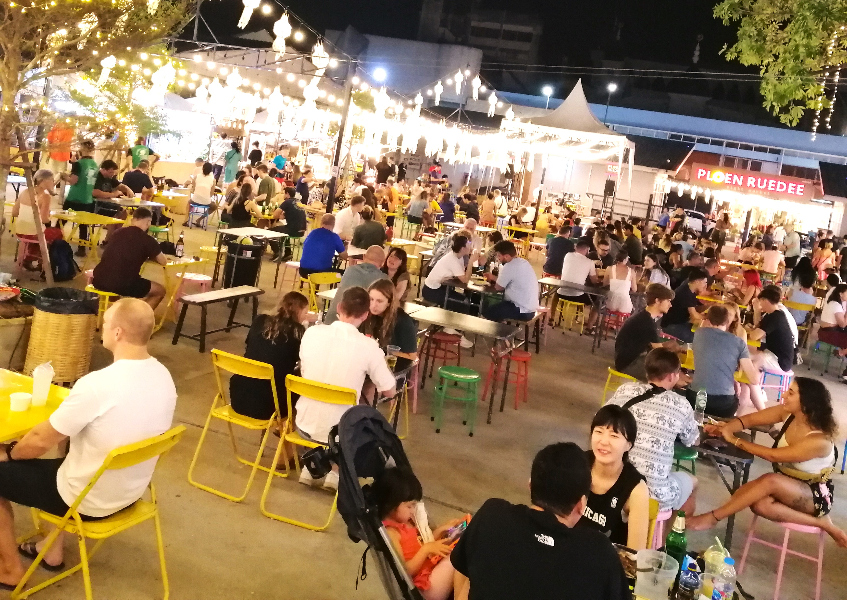
The Phoen Ruedee Night Market in Chiang Mai was created exclusively for tourists. It’s a little bit pricier than a night market dedicated to locals.
Whether targeted towards locals, tourists or both, night markets in Thailand provide a phenomenal value and great ambience. They’ve kept my food costs low on many occassions.
While being a vegan in Thailand is easy, it’s even easier in a touristy area like Chiang Mai and Phoen Ruedee. There are perks to overdone tourist venues.
5. Don’t Visit Touristy Places During Major Holidays
During semana santa (Easter week) in Latin America, guesthouse prices can double and triple in major holiday destinations like Mancora, Perú, or Santa Marta, Colombia. If you can, stay out of these places during high season and stay in less touristy destinations during these times.
However, from personal experience, planning where to be or not at the most ideal times is a challenge, where I’ve failed on many occasions.

During Loi Krathong in Chiang Mai, while the lantern decorations can feel magical, many accommodations are full, loud, and more expensive.
Still, Chiang Mai is a city with so many accommodations that you can still get lucky, look a little bit harder, or stay farther from the center and still be able to find a price closer to what your budget.
I was in Mancora, on Perú’s tropical north coast during low season. I passed back during high season. The woman at the same guesthouse told me she apologized, but her prices had tripled. Because there are so many accommodations there, I was able to walk around and find a better deal, while it felt awkward since I thought I’d built a decent relationship with the woman months prior.
In reality, there are no hard feelings. It’s all business. A mom & pop shop needs to make its money when it can. Supply and demand rule pricing. Economics run our existence.
6. Research the Haggling Culture and Bargain as You See Fit
Just throw yourself in and do it. Don’t be shy. That’s easy to say but the more you try, the better you’ll get at it.
In many parts of the tropical and developing world, you’ll be asked more than the going price. Haggling is often the norm and like anywhere, shopping around will save you money.
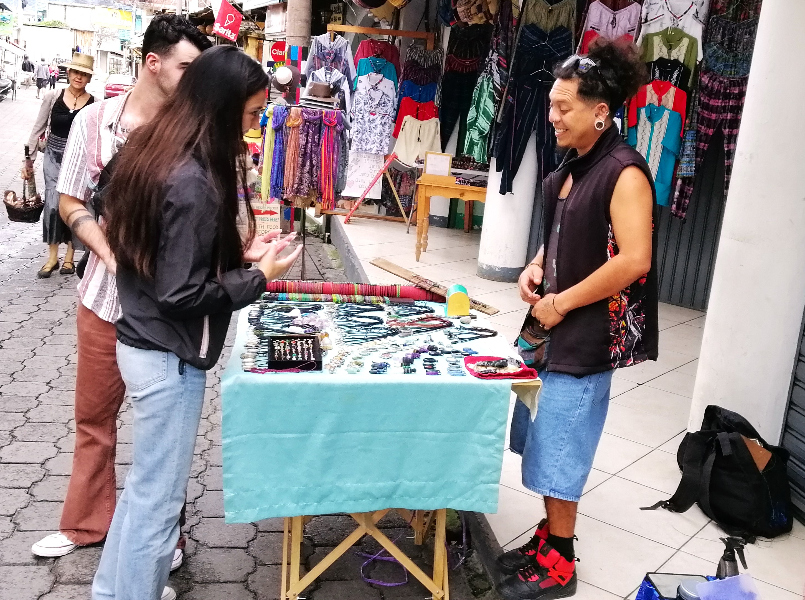
Some people are more honest than others. The closer you are to a tourist area, the more apt you are to be overcharged. While outside spots frequented by foreigners, you probably won’t be overcharged. And you might come across some of the warmest, nicest, most honest and humble people you’ve ever imagined.
Recently in peninsular Da Nang, the most touristy part of the city, I needed a pair of sunglasses. Sure enough, I came across a person selling them. I chose my pair and was quoted 200,000 Dong ($8). By the time I motioned to walk away, my final price of 50,000 ($2), was accepted.
As I rambled along the sidewalk with the new pair of eye shields, I thought:
A Vietnamese person may have gotten the pair for half what I paid. And surely there are foreigners who pay the first inflated price asked. So how can I blame this person for trying to grossly overcharge me? In the game of human survival, I can’t.
On a lighter haggle, I was recently in a book store in Laos’ capital where I bought two books. They came to 170 k Kip ($9). While handing the books over to the worker and clearly eyeing the prices pensively, I asked:
Is there a discount for buying two?
Yes, 150k.
The man didn’t use any time to think. His response was automatic.
Ask calmly and nicely and you have a solid chance of getting a discount.
Four casual words saved me a dollar. With this mentality, that’s another $365 per year. Small savings here and there may not be as small as they seem.
When in a tourist destination where you know costs are inflated, you want a money-saving mantra: BNHD: Bargain Negotiate Haggle Discount.
Always ask for a discount! This is especially true if you’re a foreigner in a touristy area. Chances are the prices are marked up. Even better, walk out of the tourist area and find that prices can be considerably lower for the same things.
7. Learn Numbers in the Local Language
And learn the phrase: how much‘ along with those numbers. If you can embed this bargaining terminology into your brain then you can more easily haggle and possibly get a better price compared to only using English. As a bonus, you may entertain the seller. This won’t hurt your cause.
Learn numbers and how much only takes a little bit of consistent mental energy.
Learning can only boost cognition and make your trip more rewarding and enjoyable.
8. Utilize Local Transportation
Most countries outside of the US have affordable and efficient public transportation systems. There are buses and trains that go to many destinations or at least closer to them. They are always the cheapest options. Although this may not hold true if you’re using a shinkansen (bullet train) in Japan. They aren’t cheap. Nor are they a bad value as the speeds these trains reach is astonishing. Japan also has buses and slow (normal) trains that can cost a fraction of what the impressive bullet train charges.
Thailand has a fairly extensive train system, which is extremely affordable, especially when utilizing 3rd class. I love the whole concept and experience. It’s so efficient and you’re traveling with the locals.
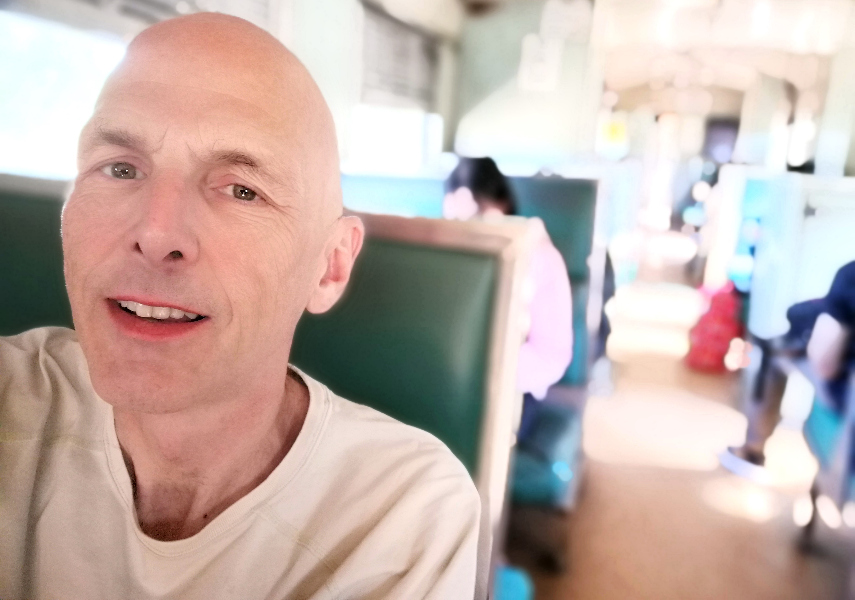
Windows are open. It’s breezy. You’re in the honest-to-goodness, genuine heart of Siam.
In Guatemala, refurbished US school buses are frequent, inexpensive, and a pulse of that nation.
If you’re traveling to Europe, look into a Eurail pass and different country or region deals. For example, if you’re traveling in Scandinavia, check into a Scandinavia pass and calculate the price of individual tickets compared to passes on offer and you might save hundreds of dollars.
9. Use a Bus or Metro Service When Arriving at an Airport
This can obviously save a lot. For example, if you fly into Boston, take the subway from the airport to the closest T (subway) stop to your destination. If you’re going far outside the city, there are airport buses that go to some locations.
In many places in the US your only option is family, friends or a ride service like Uber.
After arriving in Altamonte Springs, FL by bus from Ft. Lauderdale Airport in the middle of the night, instead of having someone pick me up, I opted for an Uber. I was first quoted $130. Having just flown into Ft. Lauderdale from Colombia, I wanted to scream because of the price. Instead, I took Eckhardt Tolle’s advice and remained calm. This is part of life.
After rebooting the phone and waiting 20 minutes, I tried again. This time it quoted me $80 for the hour and a half ride. I booked it. The Haitian woman who drove me was genuine. We had good conversations much of the way. So I gave her a $20 tip.
$100 for that ride in the US was a fantastic value. Even if it was still depressing after spending months in a more affordable land where inexpensive transportation is 100 times more available.
In Hanoi and Bangkok, there are phenomenal airport bus services that are dirt-cheap and take you to the main tourist area(s). I recently saved over $20 (taxi fare) by taking this easy bus to Hanoi’s Old Quarter. Finding the hotel was another story but I eventually did.
Like most or all cities in SE Asia, Hanoi is not a dangerous place so you can wander with your stuff at night.
10. Eat Street Food
Many cities in developing countries, especially in east Asia, have thriving street food and outdoor eatery areas. It’s usually at least half the price of a restaurant.
From personal experience, eating street food can be fun while the food can be phenomenal.
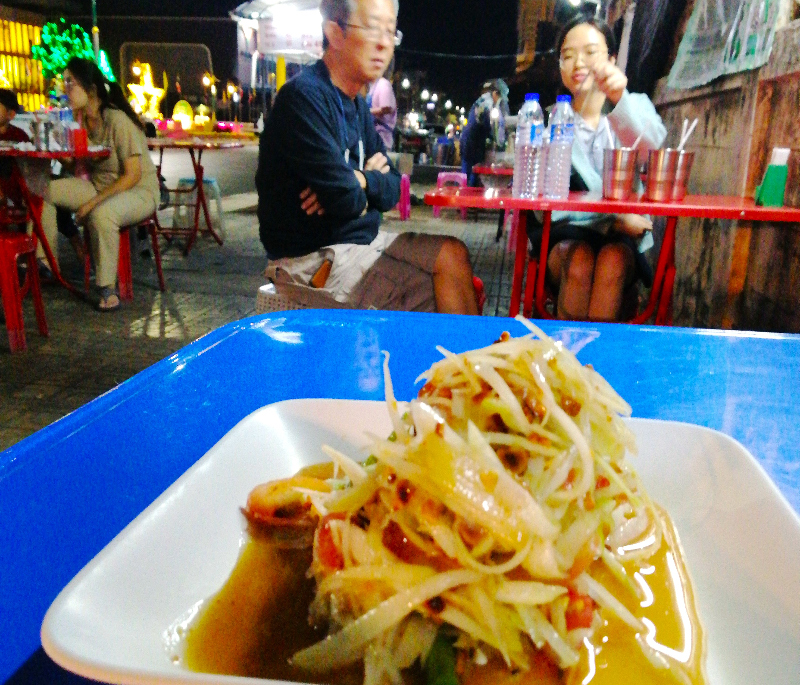
One of the best mounds of som tam (papaya salad) I’ve ever had: COST: 50 Baht ($1.40). In Thai cities, food is everywhere, especially after the sun goes down.
People will always think that traveling has to be expensive, but it doesn’t have to be.
With a little bit of thinking outside your main periphery, you, too can be a frugal world wanderer.
Can you think of any other budget travel hacks that can save drifting dollars abroad? Leave a comment below or connect on Facebook or Twitter(X).



I believe one of the biggest assets as a traveler is flexibility. We try not to irritate others. We don’t fixate on restaurant meals. Sometimes it’s delicious local bread and cheese. We also may splurge once or twice a trip on a fancy hotel when it’s in a unique spot like a castle, tree house or even a manor houses with locals is usually cheaper. It’s not for those who like to plan out every detail, but damn can you really have some adventures when every detail isn’t pre established. I love to travel this way and knowing when to be frugal is key. I love hearing about your adventures so much. I hope you write a book.
Thanks CHARLENE! Yes! I absolutely can not imagine planning everything out. While for some this works well (great for them), especially on a short vacation, but even still, I prefer to take things day by day and even moment by moment. 🙂
But don’t haggle with your massage therapist. You get what you pay for.
With a massage, I recommend going with the price asked, especially since it tends to be inexpensive in SE Asia because of stiff competition. And I like to tip 20% too. Especially when the therapist does a great job. They need it / deserve it. This is serious therapeutic tourism, TREVOR.
Some good advice. Thanks Mike!
Thanks ERNEST. Do you have any travel plans for the near future?